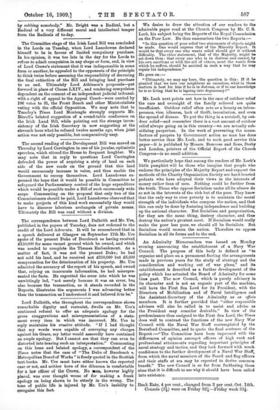Lord Dalkeith, who throughout the correspondence shows remarkable dignity and
restraint, dwells on Mr. Ure's continued refusal to offer an adequate apology for the gross exaggerations and misrepresentations of a state- ment every item in which was incorrect. Mr. Ure in reply maintains his evasive attitude. "If I had thought that my words were capable of conveying any charges against his Grace, my letter would assuredly have contained an ample apology. But I cannot see that they can even be distorted into bearing such an interpretation." Commenting on this lame and belated apology, a correspondent of the Times notes that the case of " The Duke of Buocleuch v. Metropolitan Board of Works " is freely quoted in the Scottish text-books. Mr. Ure must have either known the reported case or not, and neither born of the dilemma is comfortable for a law officer of the Crown. No Ran, however highly placed, was ever thought worse of for making a frank apology on being shown to be utterly in the wrong. The tone of public life is injured by Mr. Ure's inability to recognise this fact. We desire to draw the attention of our readers to the admirable paper read at the Church Congress by Mr. C. S. Loch, his subject being the Reports of the Royal Commission on the Poor Law. He thus summarises the two Reports :- "In this question of poor relief two statements of objects might be made. One would express that of the Minority Report. It would be that every one who wants relief should get it without difficulty. The other statement, that of the Majority, might be set down thus : that every one who is in distress and cannot, by his own exertions or with the aid of others, meet the wants from which he suffers, should be assisted in such a way that ho may regain his independence."
He goes on :—
" Ultimately, we may say here, the question is this : If it be granted that we love our neighbour as ourselves, what in these matters is best for him if he is in distress, or if to our knowledge ho is so living that he is lapsing into degeneracy ?"














































 Previous page
Previous page